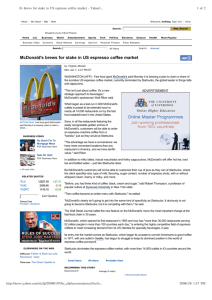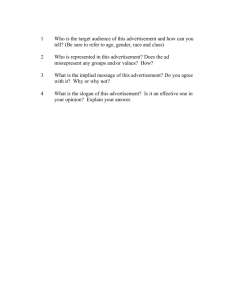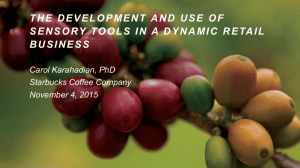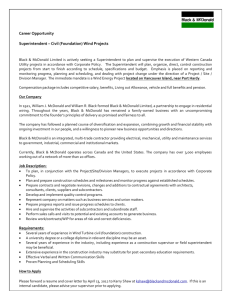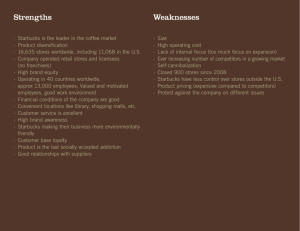Media Plan - WordPress.com
advertisement
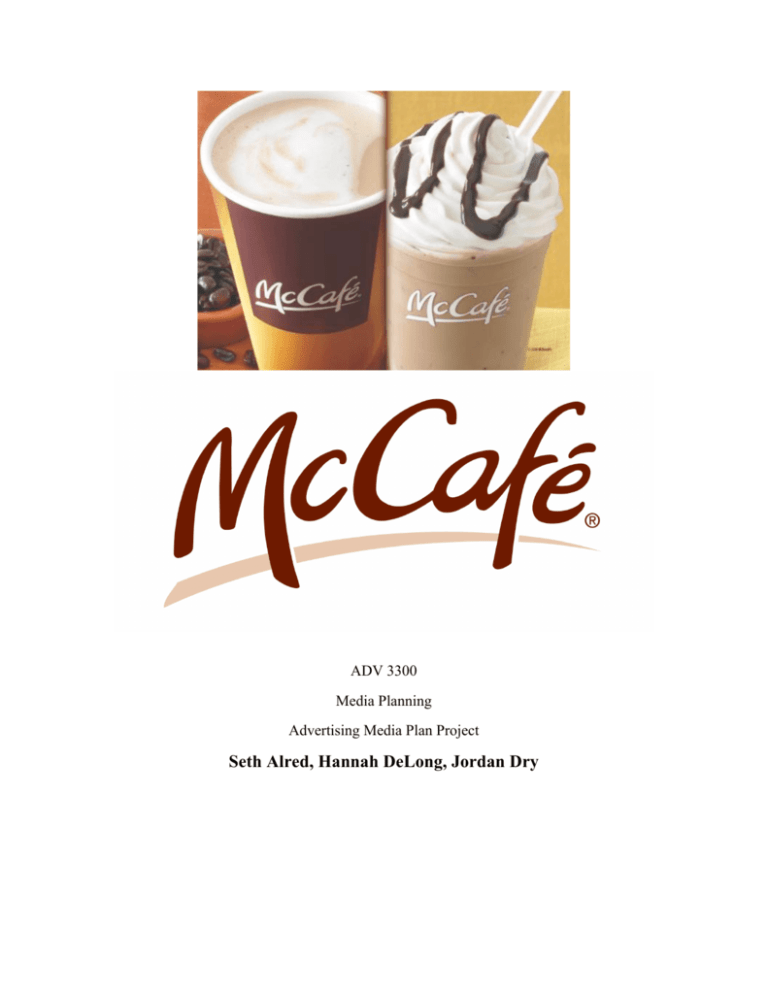
ADV 3300 Media Planning Advertising Media Plan Project Seth Alred, Hannah DeLong, Jordan Dry 2 Executive Summary __________________________________________ 3 Situational Analysis __________________________________________ 4 SWOT Analysis ____________________________________________ 10 Marketing Objectives ________________________________________ 11 Advertising Objectives_______________________________________ 11 Creative Strategy ___________________________________________ 12 Target Selection ____________________________________________ 14 Overall Media Budget _______________________________________ 15 Target Audience Coverage ___________________________________ 16 Regionality ________________________________________________ 16 Seasonality ________________________________________________ 16 Media Mix ________________________________________________ 17 Scheduling ________________________________________________ 18 Weighting, Reach & Frequency ________________________________ 18 Recommended Vehicles______________________________________ 18 Media Flowchart ___________________________________________ 19 References ________________________________________________ 21 3 Executive Summary: The fast food industry is a fast-growing industry in the United States. McDonald’s is the world’s largest fast food chain with most of its locations located in the United States. McCafé provides McDonald’s customers with the option to purchase a variety of coffee and specialty drinks. The campaign will make McCafé stand out among its competitors, Dunkin’ Donuts and Starbucks. McDonald’s is an easily recognizable brand that is also the leader in the fast food market. Those strengths combined with a focus on quality have made McDonald’s an established company. Product recalls are a major weakness for McDonald’s, as well as any company in the food industry. McDonald’s choice to expand their menu by introducing the McCafé line shows just one opportunity for the company. Threats to McDonald’s include volatile consumer choices, rising costs and intense competition. The marketing objectives the campaign suggests for McCafé are a 15% increase in sales at the end of the year and a 3% increase in market share in the specialty coffee market. The campaign’s advertising objectives include creating top of mind awareness and brand loyalty. The objectives will be reached with advertising, in store events and coupons. McDonald’s continues to use the slogan “I’m lovin’ it” in their current advertisements. Advertising for McCafé has previously pushed the idea of a quality drink at a discounted price. Since McCafé adds new drinks to its menu often many advertising efforts are focused on promoting the new products. A large portion of McCafé advertising encourages customers to try their products. 4 The target audience is males and females aged 18 to 24, preferably students. Their media consumption mainly involves television and radio therefore we recommend a campaign focused on those media. As a budget for the McCafé campaign we recommend $123 million, about 15% of their advertising budget as a whole. Eighty percent of the budget would go towards television advertising with 20% for radio advertising. To accurately reach the target audience we plan to use a pulsing media schedule throughout the summer and winter months. We aim to reach 80% of the target audience an average of 5 – 4 times. After the “heavy up” periods the plan intends to reach 60% of the target audience with an average of 3 times. While there will be a heavier focus on primetime television, the plan also includes daytime television. Television will be used to increase reach during the heavier pulsing months. Radio advertising will focus on morning and afternoon drive segments. Radio will be used to increase frequency. The recommended vehicles for the McCafé campaign range from a variety of television networks and radio stations that are popular among our target audience. Situational Analysis: Industry/Company Overview: In the United States the fast food industry is defined as “the sale of food and drinks for immediate consumption either on the premises or in designated eating areas shared with other food service operators, or for consumption elsewhere. In 2006, the United States fast food industry generated total revenues of $55.2 billion. The growth rate from 2002 – 2006 was 3.7%. Another growth of 3.7% was expected between 2006 and 2011. The value of the fast food industry is expected to reach $66.2 billion by the end of 5 2011. This popular industry in the United States reached a volume of 35.5 billion transactions in 2006. (United States fast, 2007) The McDonald’s business was founded in 1940. McDonald’s is the world’s largest fast food chain, and they are known for offering a wide range of foods. All McDonald’s restaurants offer a standard menu that includes hamburgers, cheeseburgers, chicken sandwiches, french fries, salads, milkshakes, desserts and ice cream sundaes. However, the McDonald’s menus vary by region to suit local tastes. (United States fast, 2007) As of 2010, McDonald’s was reporting revenues of $24074.60 million, which was a 5.85% increase from the previous year. (Mcdonald's corp. (mcd), 2011) McDonald’s marketing and advertising plans aim to reach many target markets. With Happy Meal, specially priced children’s meals, campaigns McDonald’s aims to reach children and parents. The McDonald’s website lists the Dollar Menu, Fruit & Maple Oatmeal and frozen strawberry lemonade as their current promotions. These promotions are aimed towards a variety of consumers. ("Promotions," 2011) By serving an average of 64 million customers daily, McDonald’s is sustaining success. (2010 annual report, 2010, p. 1) Product Review: McCafé provides the option of choosing between lattes, mochas, cappuccinos and premium hot chocolate with options of whole, 2% or skim milk and flavors such as vanilla, hazelnut and caramel. McCafé uses English terms of Small (12 ounces), Medium (16 ounces) and Large (22 ounces) with prices ranging from $2.39 for a small to 3.29 for a large beverage. (Luna, 2009) 6 McDonald's McCafé is described as "a very high quality product offered at lower prices than [its] competitors" and "serving sizes are bigger than what you find at other places." (Gaffney, 2008) McDonald's as a company has maintained a strong brand value. The brand has become synonymous with affordable quality fast food products and possesses high brand value worldwide. Such strong brand recognition has enabled McDonald's to expand into other markets with McCafé. McCafé is an attempt to conquer a new market by combining the characteristics speed and accessibility of the fast food chain with the increasing variety and affordability of a quality coffee beverage. The move into this new market for premium coffee illustrates ability to reinvent itself and appeal to consumers across the spectrum. (Morrison, 2010) By expanding to include a new market, a company expects to widen its customer base, however, in this case it has been a topic of debate. With a tough economic situation success cannot be guaranteed because the gourmet coffee market is already oversupplied. Thus, this is a weakness because McDonald's may be investing in a shrinking market. A second topic of concern is the brand’s image. In many ways, separating McCafé from McDonald's, its parent company would be ideal to convince consumers the level of quality is comparable to Starbucks and other competing coffeehouses. The difficulty in separating the two brands can be problematic because high-end quality is not a common characteristic associated with McDonald's. Lastly, adding the McCafé line has forced McDonald's to abandon some of its previous fast food assembly line strategies. It is 7 criticized for requiring employees to manage too much. The busier of McDonald's stores are experiencing a new level of chaos as employees scramble to bring together multidimensional orders, and frustration by customers is growing as profits rise. In 2010, the company saw the first drop in customer satisfaction since 2005. However, one of the key strengths of McCafé is that it increases traffic and draws customers to visit McDonalds where they might purchase additional items from the main menu leading to increased overall sales for McDonald’s. Although average number of visits has increased specific patterns became apparent. For instance traffic in new day parts specifically, breakfast and mid-afternoon were positively affected by implementing McCafé in McDonald's existing stores. As a bonus to the sales increase, the expansion will likely benefit the company in terms of a better reputation and increased popularity. (Coleman, Gao and Kim) McCafé is growing everyday making up a prominent share of the market. Don Thompson noted that during the third-quarter earnings call, McDonald’s coffee percentages in US sales increased from 2% in 2004 to 6% in 2010. Thus, the McCafé line is responsible for coffee playing a larger part in McDonald's sales. ("Burger business," 2010) Competitive Review/Competitive Advantage: The main national direct competitors for McDonald’s McCafé line are Starbucks and Dunkin’ Donuts. 8 Starbucks: Starbucks is a roaster and retailer of specialty coffees. The company’s annual sales in 2010 reached $10, 707.40 million. (Starbucks corp. (sbux), 2011) Starbucks reported a revenue increase of 9.54% over 2009. (Starbucks Corporation, 2011) In the gourmet coffee market Starbucks has a 73% market share. If Dunkin Donuts, Krispy Kreme and other smaller coffee chains are included Starbucks holds 43%. (Iwata, 2006) Some of Starbucks key benefits include strong consumer loyalty and an extensive menu. (Starbucks Corporation, 2011) Starbucks does limited advertising. The company is often “outspent on advertising anywhere from two to eight times by rivals.” (Morrison, 2011) In 2010 the company spends $94.4 million on advertising. Previously Starbucks campaigns have strongly focused on quality and their process for selecting the “best” coffee beans. (Miller, 2009) Starbucks strengths include large product and brand offerings as well as strong financial performance. The company’s wide variety of beverage, food and novelty items “appeals to a broader customer base and enhances revenue stream.” Due to Starbucks strong financial performance history, the company achieves the financial stability needed to expand and diversify. (Starbucks Corporation, 2011) Starbucks weaknesses include product recalls and an over dependence on the US market. Product recalls affect the “goodwill and brand image of the company.” Also, Starbucks “lacks in geographic spread.” Starbucks is an international company but the 9 “contribution of revenues” from the international segment is low. (Starbucks Corporation, 2011) Dunkin’ Donuts: Dunkin’ Donuts is the world’s leading coffee and baked goods chain. By the end of 2010 there were almost 10,000 Dunkin’ Donuts stores worldwide. Dunkin’ Donuts is owned by Dunkin’ Brands, Dunkin’ Brands is owned by many private equity companies. At the end of 2010, the total global system wide sales reached $6 billion. In 2010 the Dunkin’ Brands U.S. sales increased by 2.3% from the previous year. ("Media kit," 2011) The chain holds a 57% market share of “all of the coffee served up by quick service restaurants.” (Sanati, 2011) Key benefits for Dunkin’ Donuts include highly rated service as well as a dependence on fresh, fair trade coffee products. In 2008 Dunkin’ Donuts outspent McDonald’s by 60% for television advertising. Dunkin’ Donuts positions their brand as a cheaper and simpler choice compared to Starbucks. A campaign that surveyed coffee drinkers lead to 61% more traffic to the Dunkin’ Donuts website in 2008. (Young, 2009) Dunkin’ Donuts was rated the #1 foodservice retailer of “hot brewed, flavored and iced coffee” the US in 2010. The chain has strong consumer loyalty and high customer experience ratings. Dunkin’ Donuts also offers a large variety of menu items from lattes to donuts. Also, all Dunkin’ Donuts stores are franchised which leads to large opportunities for growth and expansion. ("Media kit," 2011) 10 Weaknesses for Dunkin’ Donuts include product recalls and unevenly distributed locations. Like Starbucks product recalls can harm the image of Dunkin’ Donuts. Dunkin’ Donuts franchise locations are mostly found on the Eastern side of the US, there are not nearly as many stores in the Western United States. Starbucks the primary competitor for McDonald’s McCafé line, and Dunkin’ Donuts takes the spot as secondary competitor. McDonald’s and Dunkin’ Donuts have both previously taken “stabs” at Starbucks in promotional campaigns. They both try to market their brands as a more comfortable, relaxed and cheaper choice compared to Starbucks. McDonald’s does not promote a dependency on fair trade coffee like Starbuck’s does. Since Starbuck’s does little advertising, promotion fair trade coffee is their main point. Consumers view Starbucks as a more mature, professional coffee company. Dunkin’ Donuts and McDonald’s McCafé are viewed as quick service coffee chains with quality close or equal to Starbucks. (Young, 2009) SWOT Analysis: McDonald’s is a strong company that is leading the fast food market. Another strength is that the brand is easily recognizable and dependable and it also possesses an international presence. Another strength is that the company is extremely focused on quality of their products. McDonald’s has established these strengths in the McCafé brand as well. McDonald’s and McCafé both face one major weakness: product recalls. This is an issue for any food company. Also, fast food has a negative health image across 11 the globe. This weakness can harm McDonald’s and McCafé because of health conscious consumers. Opportunities for McDonald’s are abundant. McDonald’s has already begun to seize the opportunity to expand into the gourmet coffee market with McCafé. McCafé also has the opportunity to compete with smoothie and juice chains by adding those products to its menu. Another distinguishable opportunity is that among the market they are in they are a leader of innovation and menu diversification. The potential threats that stand out to McCafé and Mcdonald’s are the volatile consumer choices, the rising costs and intense competition. America has become a “fast food nation” therefore competition is fierce. For most consumers McCafé is not the first gourmet coffee brand that is thought of and this threat could harm the McCafé brand. Marketing Objectives: The campaign intends to increase McDonald’s McCafé sales nationwide by 15% by the end of the campaign year. The projected increase in McDonald’s McCafé US market share is 3%. Advertising Objectives: There are many communication objectives for the campaign. The most important objective is to increase top of mind awareness. Starbuck’s and Dunkin’ Donuts hold the highest market shares in the specialty coffee market. To increase the McCafé market share by 3% during the campaign coupons will be distributed and special in-store events will be held. These events and coupons will enforce top of mind awareness for consumers 12 by reminding consumers that McCafé offers competitive prices and convenience. Another important objective is brand preference. Brand preference will enforce the goal of increasing sales by 15%. The advertising will create brand preference against the competitors. The advertising will focus on the fact that McCafé offers convenience because of the ability to order meals with McCafé drinks. Creative Strategy: McDonald’s continues to use the slogan “I’m lovin’ it!” in the company’s existing advertising theme. Due to the diversity of the target market they advertise for various menu items using many different tactics. For instance, one advertisement promotes free Wi-Fi availability by using a Big Mac box to portray a laptop and the recognizable Wi-Fi symbol on the other side. A second theme of the McDonald’s brand surrounds the discounted McCafé drinks available for $1. They are promoting these items using billboards, print advertising and posters. In addition to these traditional forms of advertising, the company has implemented the use of product placement. For instance, a massive amount of coffee beans marking the number of days left to get free coffee or salad to advertise the fresh new salads. McDonald’s has also adopted the phrase “Come as you are” to advertise the diversity of the company and its target market. The phrase “Free Mocha Mondays” has been used in a number of creative ads to bring customers in to try the McCafé Hot Mocha. The 2009 campaign included free 7-ounce samples to all customers every Monday from July 13 to Aug. 3. McDonald’s spokesperson, Neil Golden described the campaign strategy as “one of the largest sampling initiatives [McDonald’s has] taken on as a company.” (Christman, 2009) 13 McDonald’s has also taken advantage of the new platforms of technology such as a Frozen Strawberry Lemonade ad on mobile music players that reads, “To the city that knows a good remix.” (Kats, 2011) In Summer 2011, McDonald’s pushed its most recent addition to McCafé’s frozen beverages with its Mango Pineapple Real Fruit Smoothie. In this campaign, “McDonald’s put another giant marketing push behind the drink, not only with national television ads but also with sampling events, a Smoothie Fusion Bus Tour traveling to different events [...] and several coupon offers.” (Brandau, 2011) 14 Target Selection: Research shows that McDonald’s current advertising focuses on quality and price. Therefore, the campaign will aim to reach young adults, preferably in college. This target audience ranges in age from 18 to 24 and includes males and females. According to the 15 2010 US Census, this includes 28, 815,000 people. A 2008 report showed that the average number of cups of coffee consumed per person in the 18 to 24 age group was 3.2 daily. (Preiner, 2008) This age group makes up a large portion of the consumers of the McCafé products. About 90% of the target audience view television weekly and 85.7% listen to the radio weekly. ("Utilization and number," 2011) A 2004 survey done at Indiana University found that half of the students spend money on food and drink at least 1 to 3 times per week. Forty-eight percent of the students said they would spend more money if businesses fit their needs better with improvements. Forty-four percent of those students said lower prices would enable more spending. (Iu student spending, 2004) This profile shows that the target audience is concerned with price and that they access television and internet often. Overall Media Budget: In 2008, McDonald’s overall advertising budget was $820 million. (Goetzi, 2009) Using this as a base budget, we recommend applying 15%, $123,000,000, of the overall budget to promoting the McCafé line since it is only a part of the McDonald’s menu but has proved to have strong impacts on the company sales. We plan to allocate the budget between television and radio advertising. The plan would allocate 80% of the McCafé advertising budget to television and the remaining 20% to radio. The weight of the advertising would differ by season as the summer months of May through August and winter months of November through February, with special focus during times of college exams. Also, the weight will differ by region. In the northern regions, the winter months will receive a larger portion of their budget and the southern regions’ budgets will be heavier in the summer season. 16 Target Audience Coverage: The proposed campaign plan calls for a pulsing schedule. The “heavy up” periods would be throughout the summer season and also throughout the winter months. During the “heavy up” months the plan intends to reach 80% of the target audience an average of 4 to 5 times. In the other months during the year advertising will be slowed down to reach 60% of the target audience an average of 3 times. The index for potential in the target audience is 113, three points higher than the closest age bracket. Regionality: The media plan calls for different weights for five parts of the country: Northeast, Northwest, Midwest, Southeast and Southwest. There will be more weight in the Midwest areas because of the cooler climate during the winter season. A cooler climate creates more demand for hot McCafé drinks. During the summer and spring season there will be more weight in the Southern regions because of the demand for cold, refreshing McCafé drinks. Seasonality: The media plan calls for different weights across different months of the year according to a pulsing schedule. McCafé offers warm and cool drinks. From May to August heavier weight will be established to promote cold drinks like iced coffee. McDonald’s has previously done this with the “McCafé your day” campaign as temperatures were rising across the country. (Melnick, 2009) Similarly, from November to February heavier weight will be enforced to promote hot drinks as temperatures 17 decrease. Also, since the target audience has a large percentage of students heavier weight will be established during exam periods. Media Mix: The campaign will focus on the vehicles television and radio. According to MRI data these are the best choices for the target audience group to become part of the general mindset. The data for daytime and primetime television are similar but for the target audience more emphasis should be put on primetime television. For radio advertising the plan focuses on the morning segments and drive home segments. The quintile average for television is about 100, and the quintile average for radio is 98. There is plenty of opportunity to reach the target audience through these media. The plan stated above will reach the advertising objective. With radio advertising frequency will be increased. Television advertising will increase reach during the months that have heavier weight. The television advertising will be split between network and cable television. Television time is expensive but the CPM is low so the medium is very cost efficient. Radio advertising is cost efficient as well. McDonald’s does face some creative constraints. Two 2008 McCafé commercials followed their competitor’s Dunkin’ Donuts lead and took stabs at Starbuck’s. Mcdonald’s positioned McCafé as a place patrons can be more comfortable and not fit into the Starbuck’s “Intellectuals” or “Hipster” stereotype. This tactic did not work because Dunkin’ Donuts took a more aggressive, straightforward approach. McDonald’s tends to keep their print ads simple and straightforward. By quickly getting their message across they are successfully creating effective ads. McDonald’s previously positioned 18 McCafé as fun and affordable on the radio. They pushed the idea that McCafé makes daily tasks enjoyable. (Jargon, 2009) This tactic reminded consumers about the convenience of McCafé. McDonald’s also has a familiar, catchy radio jingle that works effectively. Scheduling: A pulsing schedule is recommended for the media plan. With a pulsing schedule more weight will be established from May to August and November to February. Weighting, Reach & Frequency: The South and Midwest will receive more emphasis during the “heavy up” pulsing months. The Southern region will receive more weight from May to August and the Midwest region will receive more weight from November to February. These two markets show potential as they were among the highest in the index category. Temperatures rise to the extreme during the summer in the south and temperatures quickly drop in the Midwest during the winter months. These factors flow with the seasonality of the pulsing media plan. By weighting these markets more heavily than the others the reach and frequency goals should be reached. Television will increase reach while radio will increase frequency. The plan intends to reach 80% of the target audience an average of 4 to 5 times during the “heavy up” months (May to August, November to February) and 60% of the target audience an average of 3 times during the other months. Recommended Vehicles: 19 The recommended vehicles for television advertising are NBC, ABC, FOX, ABC Family, Cartoon Network, Country Music Television, MTV, VH1, and ESPN. The television advertising will occur between 6:30 to 8 p.m. during the early news and primetime time slots. They will be 30-second spots. Radio stations that play alternative rock, pop, country, or hip-hop will be utilized. The morning drive, evening drive and nighttime radio spots will be 30 seconds each. Radio stations provide localized and specialized coverage. Media Flowchart: 20 21 References (2011). Utilization and number of selected media 200 to 2009. Retrieved from U.S. Census Bureau website: http://www.census.gov/compendia/statab/2012/tables/12s1133.pdf 2010 annual report. In (2010).McDonald's corporation annual report 2010 (pp. 1-50). McDonald. Retrieved from http://www.aboutmcdonalds.com/etc/medialib/aboutMcDonalds/investor_relations3. Par.56096.File.dat/2010 Annual Report (print).pdf Burger business. (2010, November 01). Retrieved from [Web log message]. (2010, November 01). Retrieved from http://buyafranchiseblog.com/?cat=57 Coleman, D., Gao, C., & Kim, H. (2009, March 11). Mcdonald's: Breaching the luxury coffee market. Retrieved from http://www.mcafee.cc/Classes/BEM106/Papers/2009/McDonalds.pdf Gaffney, M. (2008, September 4). New mccafes offer espressos and lattes Saugus advertiser, Retrieved from http://www.wickedlocal.com/saugus/news/business/x997990119/New-­‐ McCafes-­‐offer-­‐espressos-­‐and-­‐lattes Goetzi, D. (2009, May 28). Mac attack: Mcdonald's ups ad reach.Media Daily News, Retrieved from http://www.mediapost.com/publications/article/106930/mac-attackmcdonalds-ups-ad-reach.html 22 Iwata, E. (2006, December 20). Owner of small coffee shop takes on java titan Starbucks. USA Today. Retrieved from http://www.usatoday.com/money/industries/food/200612-20-starbucks-usat_x.htm IU student spending habits survey results. (2004). Unpublished raw data, School of Business, Indiana University, Bloomington, Indiana. Retrieved from http://bloomington.in.gov/media/media/application/pdf/1470.pdf Jargon, J. (2009, May 4). New ads will stir up coffee wars. The Wall Street Journal. Retrieved from http://online.wsj.com/article/SB124139141624581429.html Luna, N. (2009, May 04). Mcdonald's vs. starbucks (espresso prices). The Orange County Register. Retrieved from http://fastfood.ocregister.com/mcdonalds-vs-starbucksespresso-prices/ Mcdonald's corp. (mcd). In (2011).McDonald's corporation - financial and strategic analysis review (pp. 1-4). GlobalData. Media kit. (2011). Retrieved from http://news.dunkindonuts.com/press_file.cfm?presskit_id=2 Melnick, J. (2009, May 05). Mcdonald's launches nation ad campaign for mccafe invading territory dominated by starbucks. Medill Reports. Retrieved from http://news.medill.northwestern.edu/chicago/news.aspx?id=128047 Miller, C. (2009, May 18). New Starbucks ads seek to recruit online fans. The New York Times. Retrieved from http://www.nytimes.com/2009/05/19/business/media/19starbux.html 23 Morrison, M. (2010, November 15). Mccafe. Advertising age, 81, Retrieved from http://adage.com/article/print-­‐edition/mccafe-­‐america-­‐s-­‐hottest-­‐brands-­‐ 2010/147065/ Morrison, M. (2011, May 2). Starbucks hits no. 3 despite limited ad spending. Advertising Age, Retrieved from http://adage.com/article/news/starbucks-hits-3-limited-adspending/227316/ Preiner, J. (2008, December 3). Caffeine increases in college students' diet. The University Daily Kansan. Retrieved from http://www.kansan.com/news/2008/dec/03/caffeine/ Promotions. (2011). Retrieved from http://www.mcdonalds.com/us/en/promotions.html Sanati, C. (2011, July 26). Throwing iced coffee on the Dunkin' ipo.Fortune, Retrieved from http://finance.fortune.cnn.com/2011/07/26/dunkin-donuts-ipo/ Starbucks corp. (sbux). In (2011). Business & company resource center Gale. Retrieved from http://galenet.galegroup.com/servlet/BCRC?rsic=PK&rcp=CO&vrsn=unknown&loc ID=jack91990&srchtp=cmp&cc=1&c=1&SW=1&mode=c&ste=60&tab=1&tbst=ts CM&ccmp=Starbucks Corp.&tcp=starbucks&docNum=DC239921&bConts=1 Starbucks Corporation. In (2011). Starbucks Corporation - financial and strategic analysis review (pp. 1-4). GlobalData. United states fast food. In (2007).Datamonitor industry market research Datamonitor. Retrieved from http://galenet.galegroup.com/servlet/BCRC?vrsn=unknown&rcd=naics&locID=jack 24 91990&srchtp=ind&c=2&icd=722211&iType=naics&mode=i&ste=87&tbst=tsIS&c ind=722211 - Limited-Service Restaurants&tab=2048&n=25&docNum=A169919235&bConts=3330 Young, A. (2009, January 26). Who served up the better coffee media strategy in 2008?. Advertising Age, Retrieved from http://adage.com/article/mediaworks/comparingcoffee-media-strategies-dunkin-mcdonald-s/134095/



